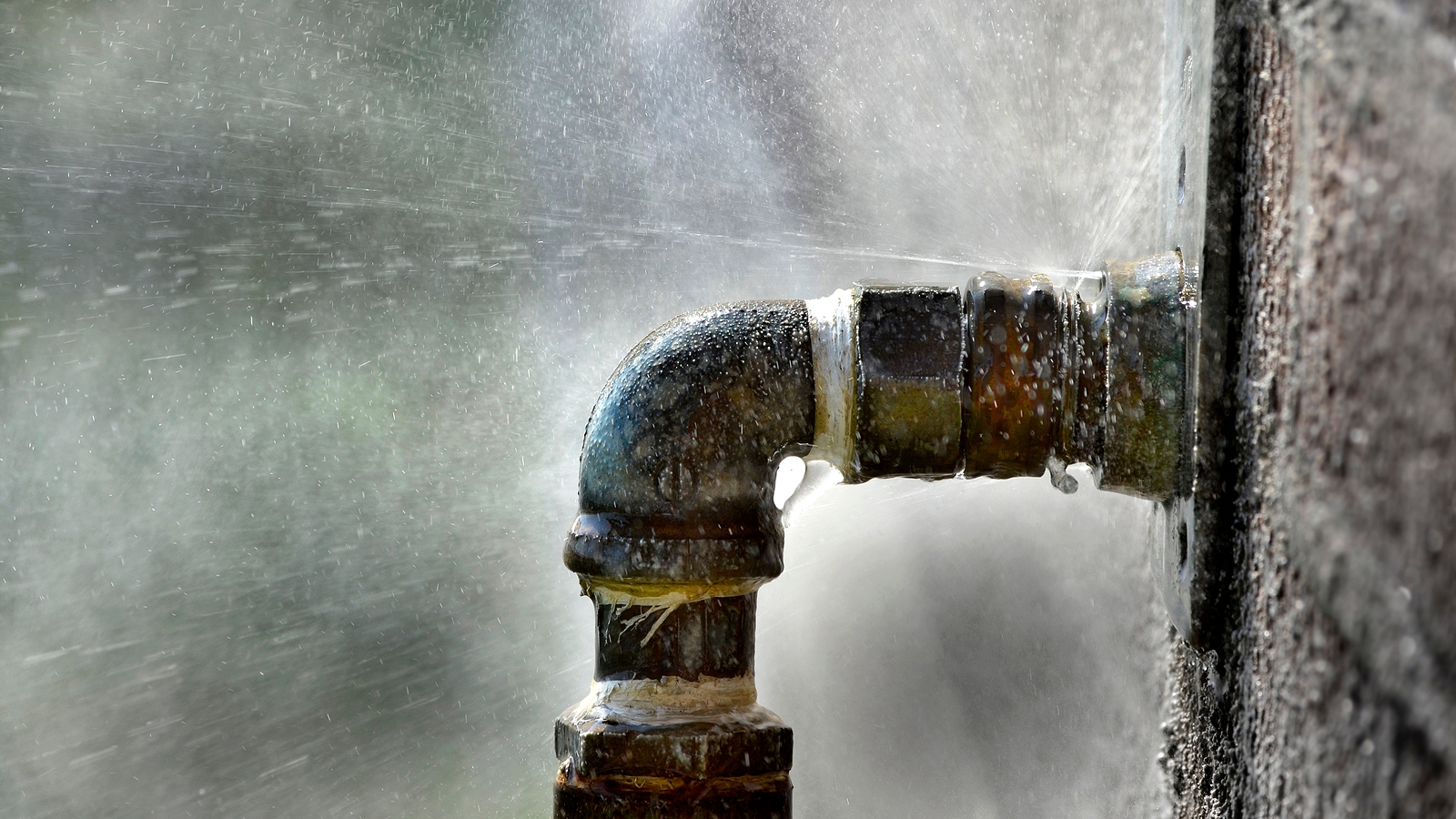Sometimes, things that are meant to stay private just sort of get out into the open, don't they? It's a bit like when water escapes from a pipe, not because someone turned a tap, but because there's a little hole or a crack that wasn't supposed to be there. This idea, of something getting out when it wasn't intended, applies to a lot more than just liquids or gases. In our busy digital lives, it very much applies to information, too.
When we talk about an "of leak" in the world of data, we are talking about a truly massive amount of private details making their way into public view. Imagine, if you will, something like sixteen billion pieces of information, all bundled up in huge collections of stored data. This kind of situation, you know, involves billions of account access codes for places like social media sites, secure network connections, places where people build software, and just regular user accounts for almost every big online service you can think of. It's a pretty big deal, actually.
So, we're looking at something that means a whole lot more than just a little drip. It's about private things becoming public, often because of some sort of fault or an accident. This kind of thing can have a real impact on people's lives, and it's something we should probably talk about a little more, in some respects, to help everyone get a better handle on what it all means for them. It's a topic that comes up quite a bit, apparently, especially with so much of our lives now being lived online.
- Movies Ten Sugarhouse
- Butternut Ski Great Barrington
- Soldier Field Chicago
- 230 5th Ave Rooftop Bar
- Arc De Triomphe Tickets
Table of Contents
- What is an "of leak" anyway?
- How Big Can a Digital "of leak" Get?
- Why Does Information "of leak" Happen?
- What Happens When Content is "of leak"?
- Where Can You Find Information About "of leak" Events?
- Can We Protect Ourselves from an "of leak"?
- Understanding the Language of "of leak"
- Keeping Your Exclusive Content Safe from an "of leak"
What is an "of leak" anyway?
When we use the word "leak," it usually brings to mind something quite simple, like water slowly making its way out of a container that has a tiny opening. This opening, you know, might be there because of a flaw or some kind of damage. The basic idea is that something meant to stay inside, or outside, for that matter, gets through a barrier that should have held it back. So, it's about an unintended movement, a passage that shouldn't have happened. It's really just a way of describing something getting out without permission, you could say.
More than just a dripping faucet
This idea of an "of leak" goes beyond just liquids or gases escaping. Think about it: a small hole or a split in something can let out light, or even sounds, that were supposed to be contained. The core meaning remains the same, though. It's always about an unintended opening, a crack, or something similar, that allows a substance, or in our case, information, to get out or even to get in. It's a release of something that was meant to be held back. So, if you hear about an "of leak" in the news, it’s not about a burst pipe in your house, typically, but something a bit more abstract, like data.
So, when we talk about a "leak," we are always referring to the release of something. It might be water, as in the example of a pipe under the sink that has a small issue, or it could be a gas. But in our modern world, it very often means information. Someone might, for instance, share a story with the press that was supposed to stay private. That, too, is a form of "leak." It's all about something getting out that was not supposed to. It's a rather simple concept, actually, but with big implications.
- Montebello High School
- Studio Suits
- Los Angeles Coroners Department
- St Louis Aquarium At Union Station Tickets
- Bell In Hand
How Big Can a Digital "of leak" Get?
The scale of some of these digital releases can be quite staggering. We've seen situations where what's been called a "16 billion strong leak" has come to light. That's a truly immense number, if you think about it. This kind of information, apparently, is often found in what are described as super massive collections of data, basically huge digital storage places. It's not just a few pieces of information, you know, but a truly enormous amount that has found its way out.
Billions of Accounts and Your Information
Within these incredibly large "of leak" events, there are often billions of specific details that allow people to access accounts. This includes the login information for popular social media platforms, for systems that help people connect to networks securely, and for online spots where software developers do their work. It also covers, you know, access details for user accounts across almost all the big online services out there. So, it's a very broad collection of personal and sensitive access codes, which is pretty concerning, in some respects, for anyone who uses the internet.
When this kind of information gets out, it means that a lot of personal details become visible. While this might seem like it offers a sort of transparency, it also brings with it a much greater chance of things going wrong for individuals. The more information that is out there about us, the more chances there are for someone to use it in ways we wouldn't want. It's a bit of a trade-off, you know, between being able to see what's happening and keeping things safe. It's a rather delicate balance, to be honest.
Why Does Information "of leak" Happen?
The reasons behind information getting out, or an "of leak" happening, can be varied. Sometimes, it's a simple mistake, like someone accidentally leaving a digital door open. Other times, it might be a flaw in a system, a weakness that someone finds and uses. It's not always a malicious act, though it often can be. The core idea is that the information was supposed to stay private, but because of some oversight or a weakness, it didn't. It's like a secret that just can't stay hidden, somehow, even if no one actively tried to reveal it.
The Unexpected Release of Content
These "of leak" events, you know, are basically about something being released without permission. It could be a simple document, or it could be something much more personal, like someone's private pictures or videos. The point is, the person who created or owned that content did not intend for it to be public. It's a bit like someone opening your private diary and reading it out loud. It's an invasion of privacy, and it can have some pretty significant effects on the people involved. It's a situation that, basically, nobody wants to find themselves in, you know?
You might have heard stories about these sorts of things happening. There are free websites, apparently, where people share content that was meant to be kept private. This kind of situation raises a really important question: how do we protect ourselves from this? It's something that a lot of people worry about, and for good reason. When your personal creations, like fitness videos, music, cooking demonstrations, or even original shows, are supposed to be for a select audience, but then they become completely free for everyone to see, it can be a real problem. It's something that, honestly, needs a lot of thought and attention.
What Happens When Content is "of leak"?
When private information or content gets out, it can have a pretty big impact on the people involved. Stories that come out about these kinds of situations, like privacy violations and other releases of personal data, really show the less pleasant sides of being well-known online. They serve as a very strong reminder for both the people who create content and those who consume it about the potential downsides that come with sharing personal things online. It's a stark reminder, basically, that the internet, for all its good, has its risks too.
The Stories Behind the Breaches
Think about creators, for example, who put a lot of effort into making special content for their audience. When that content, which is supposed to be just for paying subscribers or a private group, ends up freely available for anyone to see, it can be really damaging. It affects their ability to earn a living, and it can also really hurt their reputation and their feelings. Exploring the problems that come with "of leak" situations, especially for those who make exclusive content, is really important. It helps us figure out how to keep those special creations safe and sound. It's a pretty serious issue, to be honest, for many people who work online.
It's worth noting that when these events happen, the preferred language on many of the web pages discussing these "of leak" situations seems to be English. This might mean that a lot of the discussions, or perhaps the sources of these events, are connected to English-speaking communities. It’s just an observation about how these things appear online. The visibility that comes with such events, however, does bring with it more chances for things to go wrong. So, while it might make something known, it also opens up new avenues for problems, which is something to consider, really.
Where Can You Find Information About "of leak" Events?
There are places where you can actually find a lot of information about these kinds of events. For instance, there's something called the "library of leaks," which is described as the biggest public collection of information that was once private. It's a place where a lot of data gets added and made searchable every single day. So, if you're looking for information about past "of leak" incidents, this is one spot where you might be able to find it. It's a resource that, basically, collects a lot of these public disclosures.
This "library of leaks" has tools that let you search through documents, look up companies, and even find information about specific people. It's a place that aims to gather all sorts of publicly available information that has come out through these unintended releases. While the exact numbers of public entities, datasets, countries, and territories might change, the aim is to provide a comprehensive view of what's been made public. It’s a pretty extensive collection, from what I understand, and it's constantly growing. You know, it's a resource that can be quite helpful for researchers or anyone curious about these kinds of events.
If you have specific things you are looking for, or if you want to make requests for information related to an "of leak," some places even suggest using platforms like a Discord server. This means there are communities and channels where people discuss these matters and where you might be able to get assistance or find specific documents. It's a way for people to interact and share knowledge about these events. So, it's not just about searching databases, but also about connecting with others who are interested in the same topic, basically.
Can We Protect Ourselves from an "of leak"?
The question of how to keep ourselves safe from these kinds of information releases is a really important one. When we hear about free websites where personal content, or "of content," as it's sometimes called, gets shared without permission, it naturally makes us think about our own security. It's a situation that highlights the need for everyone to be more aware of how their personal information and creative works are being handled online. It’s a bit like locking your doors, you know, but for your digital life.
Protecting your personal creations, especially if they are meant to be exclusive or private, is something that takes effort. For people who create content, whether it's fitness routines, music, cooking videos, or other original material, keeping it from becoming freely available to everyone when it's supposed to be for a select audience is a big challenge. It requires thinking about where you put your content, who has access to it, and what measures are in place to prevent it from spreading without your approval. It's something that, basically, needs careful consideration every step of the way.
While there isn't a single magic solution, being informed is a good first step. Understanding the ways in which an "of leak" can happen, and recognizing the risks involved, helps you make better choices about what you share online and with whom. It’s about being proactive rather than reactive, trying to prevent problems before they happen. So, it's about being smart with your digital footprint, you know, and being mindful of where your information goes.
Understanding the Language of "of leak"
When we talk about "leak," there are a few ways to think about it. Beyond just the physical sense of a substance escaping, it also means to let something pass through a flaw. This could be a flaw in a system, a process, or even a person's judgment. The word itself can be used in many different contexts, but the core idea of an unintended release remains. So, if you hear someone talk about "leak synonyms" or "leak pronunciation," they are probably trying to get a better handle on the different ways this concept is expressed and understood in our language. It’s a word with a rather broad application, basically.
The English language definition of "leak" often centers on this idea of something escaping through an opening, usually due to some kind of fault or error. It’s a pretty straightforward concept, but its implications can be quite complex, especially when we apply it to information. So, whether it's a physical "water leak in the pipe under the sink" or the phrase "they leaked the story to the," the underlying meaning is about something getting out that was not supposed to. It’s a word that, honestly, carries a lot of weight in our modern conversations about privacy and data. It’s a bit of a tricky word, too, in some respects, because it can mean so many different things.
Keeping Your Exclusive Content Safe from an "of leak"
For creators who make special content, like fitness routines, musical pieces, cooking demonstrations, or other original works, keeping that content safe from an "of leak" is a very real concern. These creators often rely on their content being exclusive, meaning only certain people get to see it, perhaps through a paid subscription or a private group. When that content gets out into the wider public for free, it can have a significant impact on their ability to continue creating and earning a living. It's a situation that, basically, undermines their whole business model, you know?
Understanding the risks associated with these kinds of situations, especially for creators, is a very important step. There are often discussions and guides available that help people figure out how to protect their special content. These guides usually talk about different ways to keep things secure, like using strong passwords, being careful about where you upload your work, and understanding the privacy settings on various platforms. It’s all about taking steps to make it harder for an "of leak" to happen in the first place. It’s a pretty active process, actually, that requires ongoing attention.
The goal is to help creators keep their unique creations just for the people they intend to share them with. This means being aware of how information can spread and taking precautions to prevent it. It's about maintaining control over your own work and ensuring that its value is preserved. So, for anyone making content, thinking about these protective measures is a really important part of their overall strategy. It’s something that, in some respects, can make or break their online presence. It's a bit like building a fence around your garden, you know, to keep things safe inside.
Related Resources:



Detail Author:
- Name : Kenyon Hahn
- Username : bernardo.rodriguez
- Email : tcrona@yahoo.com
- Birthdate : 2002-04-20
- Address : 689 Leland Alley Apt. 513 Runtebury, WY 63487-2321
- Phone : 1-216-509-1180
- Company : Heidenreich-Ritchie
- Job : Garment
- Bio : Quia est autem eos sequi vel cumque. Optio rem soluta nulla sit. Quod veniam voluptatem iure est. Voluptates architecto nostrum rerum molestias.
Socials
facebook:
- url : https://facebook.com/kody_dev
- username : kody_dev
- bio : Velit voluptatum dignissimos non possimus ut quia.
- followers : 3671
- following : 162
instagram:
- url : https://instagram.com/kody.wilkinson
- username : kody.wilkinson
- bio : Pariatur ut et iste veritatis adipisci nam quas. Eaque velit labore magnam praesentium.
- followers : 3158
- following : 1891
twitter:
- url : https://twitter.com/kody_wilkinson
- username : kody_wilkinson
- bio : Iste rerum eveniet dicta. Non in praesentium illum eaque repudiandae. Modi suscipit voluptas dolorem quisquam neque ut at accusamus.
- followers : 108
- following : 577
tiktok:
- url : https://tiktok.com/@kody1138
- username : kody1138
- bio : Rem ut pariatur sapiente sunt totam ut laudantium. Esse quas cumque libero aut.
- followers : 5983
- following : 2251